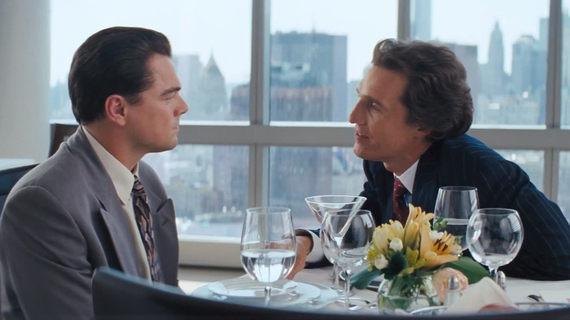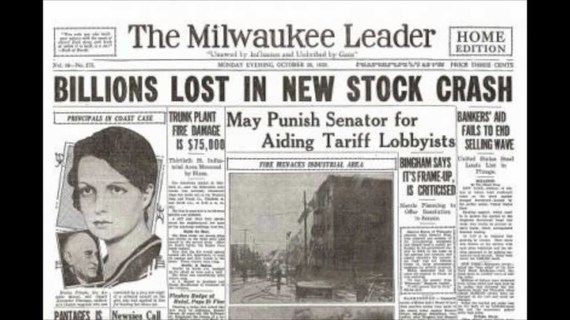
Friends often ask me, on huge down market days like Friday, what I think of equities moving forward. While I have earned decent long-term returns from Apple (which has been hit particularly hard since its April, 2015 all-time high), several ETFs, and from trading around volatile names like Twitter, I don't give financial advice for a living.
Nevertheless, friends still want to know what I think. Maybe it's because I worked for Forbes for several years. Maybe it's because my late father played bridge with Warren Buffett. Whatever the reason, they want to know.
So, here's my take on what is going on with global markets, and how you might position yourself to take advantage of a rare opportunity to make steady long-term money in equities.
First, stay calm. There's no need to make any moves right now. If you don't stay calm, you will make bad decisions. This is obvious advice, but I am continually surprised at how few people follow it.
Repeat this mantra: Bad News is Good News. You want the market to panic, not you. And not just a little panic either. Just as a perceptive investor should fear "irrational exuberance" on the upside, he or she should embrace "irrational fear" on the downside. If you are in the grip of some terrible terror in your belly that the world is coming to an end, buy, buy, buy.
The reason I didn't sell out of my positions back on May 20, 2015 when the S & P index hit its all-time intraday high (2134.72) is because the market was not yet in a state of "irrational exuberance." As the adage goes, when your taxi driver - not your overeducated Uber driver - gives you "hot" investing tips, you know the market is at a dangerous inflection point.
Right now, and for the last few years, the average retail investor barely tipped his or her toes into the market, both here and abroad (witness the crazy oscillations in the Chinese market this year due to first-time equity investors jumping in and out of that nascent retail investing environment). This ongoing skittishness shows that there is still sufficient fear in the market (born of the stock market crash of 2008-2009). As a result, it seems logical to conclude that the recent sell-off will correct itself over the ensuing few months.
But, you never know. So, stay calm. You don't have to get hysterical that you are missing some historic buying opportunity, or panic that you are about to lose your entire portfolio. If you are not ready to absorb at least a 70% drop in the value of your portfolio at any juncture in time - a juncture that could last two to three years - then you should not be investing in the stock market anyway.
Secondly, do not waste your time trying to pick ultra safe stocks amidst a major market sell-off. That's the trader's mantra, not an investor's mantra (and, believe me, you want to be the latter). While steady returns can be earned by only buying dividend-paying Dow Jones steady Eddies, or their equivalent utilities, you will be unnecessarily leaving money on the table. That is, the protection you receive is not properly rewarded by the returns you earn from that protection.
I say this because, as several reputable studies have confirmed, it's almost impossible to time the market. No one knows when the panic selling will stop and the steady Eddy stalwarts will get pushed aside for the market's growth darlings, the bulk of whose gains in a given year can often come in a one-week period of crazy bullishness (a time when you are slowly deciding whether you should sell out of your bonds, J & J, and ConEd, or your short position in Tesla).
You could be left holding the bag on some deadweight that only makes sense if we are in a prolonged bear market. You will thus be punished for your seeming prudence. Plus, constantly trading in and out of equities triggers not only brokerage fees, but also short-term capital gains taxes, which are far higher than long-term capital gains taxes (and will be getting worse once Hillary Rodham Clinton becomes President).
In other words, as I write this Sunday August 23, Monday could be the beginning of a several-month-long uptrend. Alternatively, Monday could represent a short-lived relief rally, leading to an even longer - maybe two or three years in duration - bear market. On the other hand, there could be a long bear correction of two-three months before we resume the upward bull market trajectory that began six years ago. You do not know. And neither does any "market expert."
Speaking of whom, forget what the pundits on CNBC, Fox Business News, and Bloomberg tell you. They all act like geniuses through the rear view mirror. Few of them, however, fully admit when they get things dead wrong. Moreover, none of them really knows how the market is going to behave in the next day, let alone the next year. They can provide education, for sure, but they are info-tainers in the main, and, in the best-case scenario, revisionists who rewrite their narrative to adapt to the ultimate truth of price.
As any economist knows, price is a factor of the input from all market stakeholders at any given moment. No one analyst can pre-ordain what that collective intelligence, or invisible hand, is, no matter how sophisticated the algorithms at their disposal or how many charts they use to aggressively sell you on their guesswork. No one firm or market analyst has all such information at any given moment.
This, of course, does not stop market analysts on market shows from trying to read the market tealeaves. This is because most investing pundits are directly, or indirectly, talking their own book. Just look at the roll of disclaimers that roll quickly down the screen after any stock market show. This is a list of all the positions held by traders, analysts and other experts who appeared that last hour or half-hour.
Keep this unassailable truth in mind: most traders don't want you to leave the market. This is because traders make money on trading fees. The more you trade, the more money they make. See Matt McConaughey's incredibly entertaining coke-filled lunch scene in The Wolf of Wall Street for a primer. As McConaughhey notes to Wall Street newbie Leonardo DiCaprio, "name of the game: move the money from your client's pocket to your pocket."
And, by the same token, the stock market TV shows don't want you to leave the market either because the bulk of their ad dollars come from brokers like Fidelity and Schwab, who make more money the more you trade, and the more you borrow on margin to make such trades. So, naturally, in a down market, the money shows are actively pushing trades - long or short - that you "should" make in any market, bull or bear.
Don't listen to them.
If you maintain "don't-know mind," as my late Korean Zen Master Dae Seung Sunim called "before thinking mind", you will be better served doing nothing than swallowing some narrative that Fed tightening, or cheap oil, or China growth worries, let alone rampant Chinese government corruption is causing the market to go south. After all, we've known about these headwinds for over a year now, and the market marched higher.
In terms of the biggest bogeyman currently bantied about, we've long known that the People's Republic games its market and lies to its own people and the world about the true state of its economy. It's like Saddam after 9/11. Intelligent people knew he had no weapons of mass destruction, or WMD (which weapons inspector Hans Blix confirmed), and no plans to give them to his real enemy (the Islamic nutballs that wanted his head).
However, Saddam wanted to maintain the illusion that he had WMD or the potential to make WMD to keep his internal enemies in check and to deter his neighbor Iran. Only an earnest doofus like George W. Bush would take him at his word.
So, it's not a question of whether China is dramatically slowing. It probably is slowing, as short-seller Jim Chanos has long claimed (proving only that if you maintain a position long enough you will be right at least once every other decade). Rather, it's about how China spins that slow-growth narrative to the Chinese people, who've put up with rampant air pollution, poor working conditions, low wages, and ridiculous government censorship because, in that Faustian bargain, they received a radically improved standard of living. If that brutal quid pro quo is now fraying, the real worry for global markets is not the ongoing government lie, but the huge risk - that Thomas Friedman long prophecied - of the Chinese people rising up en masse and foisting the heads of their leaders on spikes. If you know anything about Chinese history, this is by no means a far-fetched prospect.
Another scenario (seemingly as dire) is that the Communist Party in Beijing staves off rebellion, and like Vladimir Putin in Russia, becomes militarily adventurous to distract from economic troubles at home. We already see increased Chinese land reclaiming on some of the Spratly Islands in the disputed waters of the South China Sea, just as the People's Republic is hitting economic headwinds. But even this scenario, or some increased conflict between North and South Korea, may not be bad for the markets, especially if the price of oil spikes as a result. Contrary to what most pundits say, war, or the imminent threat of war, does not necessarily decrease equity prices.
Which is all to say, whatever the worst case scenario, stay calm, don't start suddenly selling stocks or reducing all risk in your portfolio, or acting on what self-serving investing pundits tell you. Instead, follow a strategy that has worked for me and other savvy investors for decades: hub and spoke.
The hub of your portfolio should be in passively traded ETFs that track major indexes. You might consider adding to those positions as the market tanks. Those ETFs should carry a bias towards risk. So, you would want to put a fair amount into the Russell 2000 Small Cap Index (IWM) because small caps tend to have a higher risk profile, and, as a result, higher rates of return over the long term. And you should buy either the Powershares QQQ (a.k.a. the Q's) that tracks the tech-laden NASDAQ, or a stock that is a decent proxy for the NASDAQ, such as a stable, dividend-paying, but still growth-oriented stock like Apple. This is because, of the three major U.S. indices (the Dow, the S & P 500 and the NASDAQ), the NASDAQ outperforms the others over time. You also might want to buy a few foreign ETFs (such as EWG, which covers export-heavy Germany, or EEM, which covers emerging markets).
If you want to spend 15-20% on a few high-risk spokes - or individual company equities - such as Lululemon (which I own) or Netflix and Facebook (both of which I have owned), go for it. But the bulk, or hub, of your portfolio should be in higher-risk ETFs that give strong returns, but, by nature of their high diversification, keep you from being completely knocked out of the market in any downturn, whatever its ultimate cause.
- Buy the books of James Marshall Crotty here

